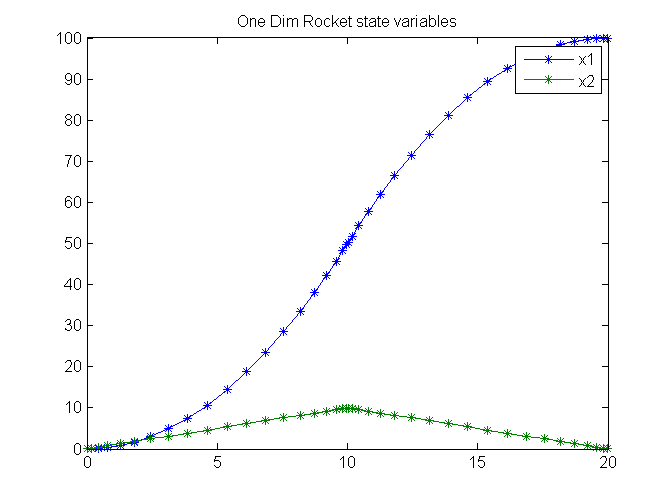PROPT One Dimensional Rocket Ascent: Difference between revisions
From TomWiki
Jump to navigationJump to search
No edit summary |
No edit summary |
||
| Line 10: | Line 10: | ||
<math> J = tCut </math> | <math> J = tCut </math> | ||
subject to: | subject to: | ||
<math> \frac{dx_1}{dt} = x2 </math> | <math> \frac{dx_1}{dt} = x2 </math> | ||
<math> \frac{dx_2}{dt} = a-g \ (0<t<tCut)</math> | <math> \frac{dx_2}{dt} = a-g \ (0<t<tCut)</math> | ||
<math> \frac{dx_2}{dt} = -g \ (tCut<t<t_F)</math> | <math> \frac{dx_2}{dt} = -g \ (tCut<t<t_F)</math> | ||
<math> [x_1 \ x_2] = 0 </math> | <math> [x_1 \ x_2] = 0 </math> | ||
<math> g = 1 </math> | <math> g = 1 </math> | ||
<math> a = 2 </math> | <math> a = 2 </math> | ||
<math> x_1(t_f) = 100 </math> | <math> x_1(t_f) = 100 </math> | ||
<source lang="matlab"> | <source lang="matlab"> | ||
Revision as of 08:10, 9 November 2011
|
This page is part of the PROPT Manual. See PROPT Manual. |
User's Guide for DIRCOL
Problem 2.3 One-dimensional ascent of a rocket
Problem Formulation
Find tCut over t in [0; t_F ] to minimize
subject to:
% Copyright (c) 2007-2008 by Tomlab Optimization Inc.Problem setup
toms t
toms tCut tp2
p1 = tomPhase('p1', t, 0, tCut, 20);
p2 = tomPhase('p2', t, tCut, tp2, 20);
t_f = tCut+tp2;
x1p1 = tomState(p1,'x1p1');
x2p1 = tomState(p1,'x2p1');
x1p2 = tomState(p2,'x1p2');
x2p2 = tomState(p2,'x2p2');
% Initial guess
x0 = {tCut==10
t_f==15
icollocate(p1,{x1p1 == 50*tCut/10;x2p1 == 0;})
icollocate(p2,{x1p2 == 50+50*t/100;x2p2 == 0;})};
% Box constraints
cbox = {
1 <= tCut <= t_f-0.00001
t_f <= 100
0 <= icollocate(p1,x1p1)
0 <= icollocate(p1,x2p1)
0 <= icollocate(p2,x1p2)
0 <= icollocate(p2,x2p2)};
% Boundary constraints
cbnd = {initial(p1,{x1p1 == 0;x2p1 == 0;})
final(p2,x1p2 == 100)};
% ODEs and path constraints
a = 2; g = 1;
ceq = {collocate(p1,{
dot(p1,x1p1) == x2p1
dot(p1,x2p1) == a-g})
collocate(p2,{
dot(p2,x1p2) == x2p2
dot(p2,x2p2) == -g})};
% Objective
objective = tCut;
% Link phase
link = {final(p1,x1p1) == initial(p2,x1p2)
final(p1,x2p1) == initial(p2,x2p2)};Solve the problem
options = struct;
options.name = 'One Dim Rocket';
constr = {cbox, cbnd, ceq, link};
solution = ezsolve(objective, constr, x0, options);Problem type appears to be: lpcon
Time for symbolic processing: 0.11449 seconds
Starting numeric solver
===== * * * =================================================================== * * *
TOMLAB - TOMLAB Development license 999007. Valid to 2011-12-31
=====================================================================================
Problem: --- 1: One Dim Rocket f_k 9.999998166162907200
sum(|constr|) 0.000733735151552596
f(x_k) + sum(|constr|) 10.000731901314460000
f(x_0) 10.000000000000000000
Solver: snopt. EXIT=0. INFORM=1.
SNOPT 7.2-5 NLP code
Optimality conditions satisfied
FuncEv 1 ConstrEv 10 ConJacEv 10 Iter 8 MinorIter 91
CPU time: 0.015600 sec. Elapsed time: 0.015000 sec.
Plot result
t = [subs(collocate(p1,t),solution);subs(collocate(p2,t),solution)];
x1 = subs(collocate(p1,x1p1),solution);
x1 = [x1;subs(collocate(p2,x1p2),solution)];
x2 = subs(collocate(p1,x2p1),solution);
x2 = [x2;subs(collocate(p2,x2p2),solution)];
figure(1)
plot(t,x1,'*-',t,x2,'*-');
legend('x1','x2');
title('One Dim Rocket state variables');



![{\displaystyle [x_{1}\ x_{2}]=0}](https://wikimedia.org/api/rest_v1/media/math/render/svg/01bec35b85324d20ae8c81fe1e024601cd151f94)



